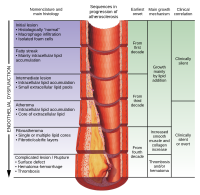
Photo from wikipedia
The association of dietary factors with urinary bladder cancer prognosis has scarcely been investigated, and results of studies conducted to date are inconsistent. We investigated whether empirically derived dietary patterns… Click to show full abstract
The association of dietary factors with urinary bladder cancer prognosis has scarcely been investigated, and results of studies conducted to date are inconsistent. We investigated whether empirically derived dietary patterns are associated with risks of recurrence and progression in non‐muscle‐invasive bladder cancer (NMIBC) patients. Data from 595 newly diagnosed NMIBC patients from an ongoing prospective cohort study were used to derive dietary patterns using exploratory factor analysis. Factor scores were calculated and then categorized in sex‐specific tertiles. Multivariable‐adjusted proportional hazards regression models were used to estimate hazard ratios and 95% confidence intervals for the associations between tertiles of adherence to the dietary patterns and risks of recurrence and progression. We identified four dietary patterns: “fruits and vegetables,” “Western,” “low‐fat,” and “Tex‐Mex.” Patients in the highest tertile of adherence to the Western pattern experienced a 1.48 times higher risk of recurrence (95% CI 1.06–2.06) compared to patients in the lowest tertile. No statistically significant associations of a Western diet with risk of progression or of the other dietary patterns with risk of recurrence and progression were found. Overall, we found that adherence to a Western diet was associated with a higher risk of recurrence but further studies are needed to confirm our findings.
Journal Title: International Journal of Cancer
Year Published: 2018
Link to full text (if available)
Share on Social Media: Sign Up to like & get
recommendations!